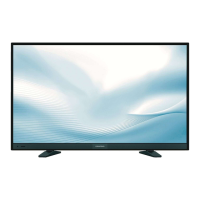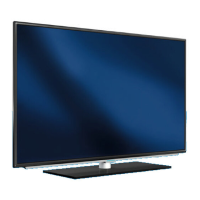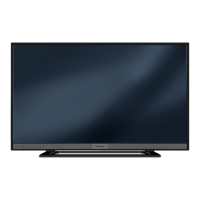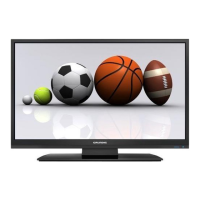Do you have a question about the Grundig 32 VLE 6735 BP and is the answer not in the manual?
General information about the television set's capabilities and features.
Important safety warnings to prevent hazards like electrical shock and fire.
Precautions to prevent injuries caused by the TV set falling from unstable surfaces or furniture.
Guidelines for responsible disposal of batteries, packaging, and the TV set.
Overview of the television's capabilities, including digital reception and media connectivity.
Requirements and methods for receiving digital satellite, terrestrial, and cable TV broadcasts.
Explanation of the SCR system for individual satellite signal reception.
Advice on preventing screen burn-in from static images and optimizing picture quality.
List of items included in the TV package.
List of accessories available for separate purchase.
Instructions for connecting the TV to the antenna and power source for initial operation.
Guidance on physically setting up the television, either on a stand or for wall mounting.
Steps for inserting batteries into the television's remote control for operation.
Diagram and description of all input/output ports available on the television set.
Location and function of the physical buttons on the television set for basic control.
Explanation of the primary buttons and their functions on the television's remote control.
A visual guide detailing the step-by-step process for the television's initial configuration.
Instructions for connecting the TV to a home network via LAN or WLAN, including automatic and manual methods.
How to search and tune digital (DVB-S, DVB-C, DVB-T) and analogue television channels.
Step-by-step guide to configure language, country, and basic settings during the first TV startup.
Adjusting picture format, mode, backlight, and accessing advanced settings for image enhancement.
Detailed picture quality settings like Vibrant Colour, Gamma, Dynamic Contrast, and Film Mode.
How to restore factory default picture settings and exit the menu.
Adjusting sound mode, volume, DTS TruSurround, TV location, and stereo/dual channel settings.
Fine-tuning audio with the equalizer and enabling automatic volume limiting for consistent sound.
Instructions to restore default sound settings and exit the menu.
How to turn the TV on/off, switch between operating modes, and select channels directly or via lists.
Adjusting volume, muting sound, and displaying program information on screen.
Settings for audio language, subtitles, and using the zap function for quick channel switching.
Setting the sleep timer to automatically turn off the TV and using the zoom function to enlarge the picture.
Options for changing the picture format (Auto, 16:9, 4:3, LetterBox) to optimize display.
Adjusting the text size for the electronic program guide display.
Explanation of HbbTV technology for interactive teletext broadcasts and its requirements.
How to use HbbTV, manage its features, and deactivate/activate digital teletext.
Using TOP text, FLOF text, and normal text modes for accessing teletext information.
Using teletext features like skipping waiting time, increasing character size, and split screen.
Details on recording/playing digital TV programs, including limitations and requirements for external media.
Instructions on how to connect USB storage devices (hard drives, sticks) to the TV for recording.
Methods for recording programs, including one-touch and from the channel list, with important notes.
How to modify existing recording timers or delete them from the schedule.
List of supported video, image, and audio file formats for playback via USB.
Instructions for safely connecting and disconnecting external data media from the TV.
How to play back files, navigate media, and view file information, with important notes on file compatibility.
Using features like chapter selection, track/picture search, time seeking, and repeat functions.
How to play video, music, and image files from a home network using DLNA/DMS.
Steps to select a digital media server and use playback options for files accessed remotely.
Agreements, first-run operations, and managing accepted terms and conditions for Smart Inter@ctive TV.
Introduction to Smart Inter@ctive TV applications, USB peripheral support, and getting started.
Understanding the main screen layout and navigating applications within the portal.
Navigating the web browser interface and using its features for internet access.
Changing menu, audio, subtitle, and keyboard languages for the TV interface.
Using subtitle mode and audio description for enhanced accessibility on digital channels.
Configuring automatic TV standby and controlling the display of feature logos.
Adjusting power LED brightness and enabling power saving modes for reduced energy consumption.
Setting a timer for the TV to automatically switch to standby mode after a specified duration.
Programming the TV to switch on automatically at a set time with preferred channel and volume.
Setting a timer for the television to automatically switch off after a specified period of inactivity.
Setting parental controls for content access and locking menus to prevent unauthorized changes.
Changing the TV's PIN code and blocking specific television channels based on parental ratings.
How to view blocked channels with a PIN and procedures for resetting a forgotten PIN code.
Setting the TV's date and time automatically or manually via time zone adjustments.
Viewing device information and updating software via OAD, Internet, or USB.
Information on connecting and using various accessories with the TV.
Resetting the TV to original state and deleting channel history.
Explanation of DIGI LINK for controlling connected devices via HDMI, including device search.
Setting up remote control functions for external devices and switching them to standby mode.
Capabilities for playing HDTV signals and details on various connection ports.
Detailed instructions for connecting various digital and analogue devices via HDMI, Component, and SCART.
Connecting headphones and setting up Hi-Fi systems or AV receivers, including HDMI ARC activation.
Using Liveshare for wireless screen sharing from mobile devices and laptops.
Understanding the Common Interface slot, inserting CA modules, and access control for encrypted channels.
Initial steps for connecting the TV to a home network via wired or wireless connections.
Configuring wired network connections using automatic or manual IP settings.
Connecting to a wireless network using WPS Push Button or PIN methods.
Connecting to a wireless network by manually entering the password.
Connecting the TV to a wireless network whose SSID is not visible.
Tuning all digital satellite channels automatically, including channel type and scan mode selection.
Manually searching for digital satellite channels by entering transponder details.
Configuring antenna settings for automatic satellite channel search, including LNB settings.
Setting up the SCR system and performing automatic satellite channel searches.
Configuring antenna settings for DiSEqC 1.0/1.1 and searching digital satellite channels.
Adjusting satellite antenna position using DiSEqC 1.2, including moving modes and step size.
Tuning digital channels from the cable provider automatically, selecting scan type and channel options.
Manually searching for digital cable channels by frequency and selecting digital/analogue options.
Tuning digital terrestrial TV channels automatically, including antenna power settings.
Manually tuning digital terrestrial TV channels by entering frequency and selecting digital/analogue options.
Setting up analogue channels, either automatically or by entering channel numbers.
Technical details for wireless LAN and Bluetooth modules, including frequency ranges.
A guide to common TV problems, their possible causes, and suggested remedies for resolution.
Definitions of technical terms, features, and protocols used throughout the user manual.
| Screen shape | Flat |
|---|---|
| Response time | - ms |
| Display diagonal | 32 \ |
| Display brightness | - cd/m² |
| Display technology | LED |
| Native aspect ratio | 16:9 |
| Peak luminance ratio | 65 % |
| Display diagonal (metric) | 80 cm |
| Motion interpolation technology | PPR (Picture Perfection Rate) 800 Hz |
| 3D | No |
| Triple tuner | Yes |
| Annual energy consumption | 59 kWh |
| Channels quantity (DVB-C) | 1000 |
| Channels quantity (DVB-S2) | 6000 |
| Channels quantity (analog signal) | 100 |
| Tuner type | Analog & digital |
| Analog signal format system | - |
| Digital signal format system | DVB-C, DVB-S2, DVB-T2 |
| Processor cores | 2 |
| Audio formats supported | AAC, M4A, MP3, WAV |
| Image formats supported | BMP, JPG, PNG |
| Video formats supported | AVI, DAT, MKV, MOV, MP4, MPG, TRP, TS, VOB, XVID |
| Product color | Black |
| Panel mounting interface | 100 x 100 mm |
| Headphone outputs | 1 |
| HDMI ports quantity | 3 |
| USB 2.0 ports quantity | USB 2.0 ports have a data transmission speed of 480 Mbps, and are backwards compatible with USB 1.1 ports. You can connect all kinds of peripheral devices to them. |
| Component video (YPbPr/YCbCr) in | 0 |
| Audio decoders | DTS, DTS TruSurround |
| RMS rated power | 14 W |
| AC input voltage | 220 - 240 V |
| AC input frequency | 50 - 60 Hz |
| Power consumption (max) | 65.1 W |
| Power consumption (standby) | 0.3 W |
| Power consumption (typical) | 40.1 W |
| Package depth | 142 mm |
| Package width | 797 mm |
| Package height | 540 mm |
| Package weight | 6600 g |
| Depth (with stand) | 178 mm |
|---|---|
| Height (with stand) | 484 mm |
| Depth (without stand) | 76.6 mm |
| Width (without stand) | 735 mm |
| Height (without stand) | 443 mm |
| Weight (without stand) | 5400 g |











